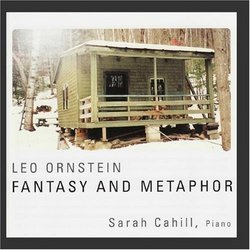An American Composer Rediscovered
Robin Friedman | Washington, D.C. United States | 01/06/2009
(5 out of 5 stars)
"In the course of an astonishing long life, Leo Ornstein (1893 - 2002) had many shifts of fortune. Recognized as a child prodigy on the piano, Ornstein's family fled the Russian pogroms and moved to New York City in 1906. Ornstein studied piano and composition and graduated from what would become the Juilliard School of Music. From 1915 through the mid 1920's, Ornstein was famous as a concert pianist and notorious as a composer of highly dissonant, futurist works of avant-garde music. Coming from a poor Russian Jewish family, Ornstein married a wealthy heiress, Pauline Mallet-Provost. In the 1920s, Ornstein abruptly retired from the concert stage and founded a music school in Philadelphia. In the 1940s, the Ornsteins sold the school and lived in various places far from the public eye, including a trailer park in Brownsville, Texas. At this point in his life, few people remembered anything about Ornstein, the charismatic pianist and former "bad boy" of music.
Throughout his life, Ornstein continued to compose. In the 1970s he was rediscovered and gave several interviews. His music received exposure in concerts and in recordings. Ornstein composed music into his 90's and died in a nursing home in Green Bay, Wisconsin in 2002 at the age of 108 or 109. In 2007, musicologists Michael Boyles and Denise Von Glahn wrote a biography of this fascinating and elusive figure: "Leo Ornstein: Modernist Dilemmas, Personal Choices." Ornstein's son, Servio, maintains a website devoted to his father's music which includes the scores for many of his compositions.
This CD of Ornstein's piano music, "Fantasy and Metaphor" consists of 15 short compositions dating from the 1960s and 1970s performed by the noted avant-garde pianist Sarah Cahill. It is the third CD of which I am aware devoted to Ornstein's works for solo piano, following recordings by Marc-Andre Hamelin on Hyperion and Janice Weber on Naxos. The Hamelin and Weber recordings include some of Ornstein's futurist early compositions as well as piano sonatas written when the composer was in his 90s. Thus, with the exception of "A Morning in the Woods" (1971) on the Weber CD, none of the works on Cahill's CD have been recorded before. It is a discovery to hear this music.
Although these compositions are distinctly 20th Century in character, they lack the wildness and iconoclasm of Ornstein's youth. As he aged, Ornstein lost contact with the musical establishment and with most other composers. With some justification, Ornstein claimed that he composed from his heart rather than in obeisance to any style. Thus most of the music on this CD is melodious and accessible, if definitely modern and with dissonances. Much of the music has an improvisatory, shimmering feel. The pieces tend toward the introspective and mystical in character with melodic lines in the upper register of the piano, light runs, clusters of notes, and frequent rolling arpeggio accompaniment. The music seems to me indebted to the French impressionists and to Scriabin. Some of the rhythms and melodic lines have the feel of jazz. The music is technically daunting to play. Many of the pieces have programmatic titles. There is a certain amount of repetition in these pieces, but the effect remains moving.
The most impressive works on this CD are the "Three Tales" titled, "Rendevous at the Lake", "A Fantasy" and "Midnight Waltz" that Ornstein composed in 1977. These pieces generally alternate between a quiet, opening section and a more stormy middle section before a return of the initial material. The melodic lines tend to be written high in the register of the piano, frequently with accompaniment deep in the bass. Of the three works in this set, the "Midnight Waltz" features an angular, astringent opening dance theme which bursts into passion midway.
The three fantasy pieces of 1960-1961 and the collection of six untitled works, here called "Metaphors" are reflective works, generally in moderate tempo, full of melody. One gets the impression of the composer improvising at the piano. I found the three fantasy pieces and the two concluding metaphors the most impressive of these works.
Ornstein's "A Morning in the Woods" draws inspiration from the period in Ornstein's life when he resided in a cottage in White Mountain, New Hampshire. The aptly titled "Solitude" (1978) is quietly meditative throughout. And the CD concludes with the harmonically quirky "To a Grecian Urn", said to be one of the favorites of the composer's wife.
The music on this CD is quietly beautiful and compelling. There surely remains more music of this composer that is worth discovering and hearing. For all the notoriety of his youth, it may be the quiet, reclusive Ornstein of old-age that will ultimately be remembered.
Robin Friedman
"


 Track Listings (15) - Disc #1
Track Listings (15) - Disc #1